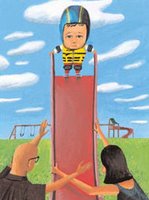
from w
I wonder how many Fiji parents are like helicopters, hovering over their precious children, watching their every move, taking their lunches at midday to them, doing their homework for them? I guess parents need to give their children space some of the time to make their own decisions, to experience failure, the consequences of bad decisions, to be realistic and resilient.
Helicopter parents
Some American and Australian parents are tracking their children in a device in their shoes or a tracking device around their necks. When you're not with them, you can be comforted by their red blip on your screen. When they move out of their designated safe zones, your child can be reeled back into the sanitised world and therefore bypass any chance of imagination-stimulating adventure.
And what is helicopter parenting?
Parents who, even with their teens boarding at uni, drive two hours to tidy their dorms and do their laundry. They hover over their children, whether young, teenage, or adult!
Imagine the ramifications of tracking devices and helicopter parents on Huck Finn. He and Jim would never have built their raft and sailed the Mississippi. And Alice might never have followed the white rabbit down the hole under the hedge, and there wouldn't have been a Famous Five or Secret Seven. Had Dorothy been attached to a tracking device, Lucy, Edmund, Susan and Peter would never have had the freedom to stumble through the winter coats into Narnia.
Notes adapted from
Kids denied 'real world' lessons By Cheryl Critchley January 05, 2007 12:00am Melbourne
Well-meaning parents are smothering children by over-protecting and doing everything for them. Deakin University education lecturer Dr Helen McGrath says "paranoid parenting" was so bad many children had few life skills and some were ending up depressed.
Some parents:
• DISCOURAGE children from taking the slightest physical risks, such as walking down the street.
• COMPLAIN to schools if their child is punished for being naughty.
• TAKE items banned on excursions like cameras to the location for them.
• INVESTIGATE why their upset child wasn't elected school captain.
• CRY bullying if their child has one run-in with another child.
• DELIVER fast food for school lunch to show how much they love their child.
Dr McGrath said parents had to allow their children to make mistakes, miss out and learn from the experience. "How on earth do you become a successful human being if you can't face life's risks?" she said. "I think most parents are actually quite lost. They intuitively feel that they're not getting it right. Being resilient means coping with negative events in one's life and 'bouncing back' to a state of emotional wellbeing," Dr McGrath says. "Young people who have the skills to be resilient have a lower likelihood of becoming depressed or suicidal and a higher likelihood of having more satisfying lives and greater emotional wellbeing.’
While some parents in Fiji might be helicopter parents most of them would lie in the passive parents category. They spend more time on drinking grog and talanoa with the neighbours and relatives, attending to church and choir obligations, attending social functions, coming home late at night and leaving early the next day for work, etc. It is fortunate that Fiji has a good social structure that allows kids to fall back on the extended family members for moral support. Otherwise, we would be a breeding ground for socially dysfunctional people and a failure of society in future.
ReplyDeleteYes, there is a huge difference between the 'helicopter parents' and the way many families in Fiji operate. You are right that often the children are left to their own devices. There needs to be a balance between the two ways of parenting.
ReplyDeleteIs there a difference between rural families and urban families? Perhaps not, but Suva kids can get into more mischief perhaps?
w.
Don't get the Moody Minstrel started on this topic. As a teacher he sees it all the time. Japan is full of "helicopter parents" - and spoiled kids.
ReplyDelete